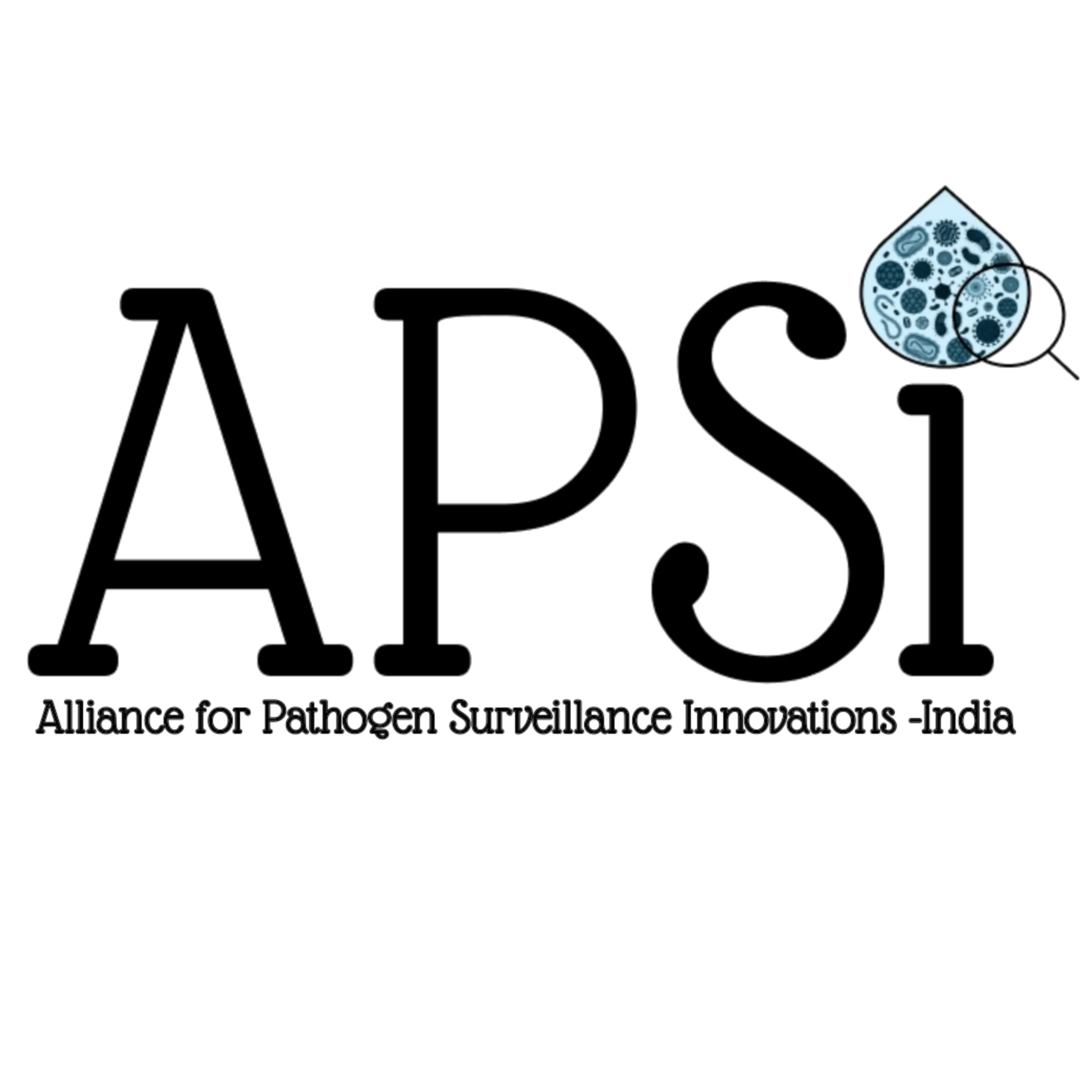Charting the Path: A Journey into Advancing Pathogen Surveillance Systems.
Surabhi Srivastava, APSI Program Lead

In the ever-evolving battle against infectious diseases, the need for robust surveillance and early detection systems has never been more critical than at the height of the COVID-19 pandemic. Leading academic institutions in the country came together to join hands with the Rockefeller Foundation (RF) for an ambitious program in response to the formidable public health challenges posed by SARS-CoV-2, the virus that causes COVID-19.
Forming the RF-India Consortium
The genesis of our endeavor can be traced back to 2021, during the second wave of COVID- 19 infections in India. COVID-19: the second wave and beyond was conceptualized to upscale SARS-CoV-2 genomic surveillance in India, complementing the ongoing efforts of INSACOG. This vision became a reality through the collaborative efforts of numerous organizations across Hyderabad, Pune, Bengaluru, and New Delhi, generously supported by RF to create the RF-India Consortium.
In the wake of the devastation caused by the Delta variant, the need to advance pathogen genomics pipelines and accelerate data sharing within the country and globally had acquired even greater urgency. The consortium set up an advanced surveillance platform, incorporating SARS-CoV-2 viral genome sequencing from patient samples as well as wastewater-based surveillance (WWS) and detection by enhancing bioinformatics, data sharing and analytics pipelines. Simultaneously, we built capacity for continuous monitoring of COVID-19, trained new personnel on various aspects of detection and genome surveillance, and developed standard operating procedures and workflows to streamline clinical genome sequencing and WWS strategies across the consortium.
The graphics below summarize our work in the first year of the program.
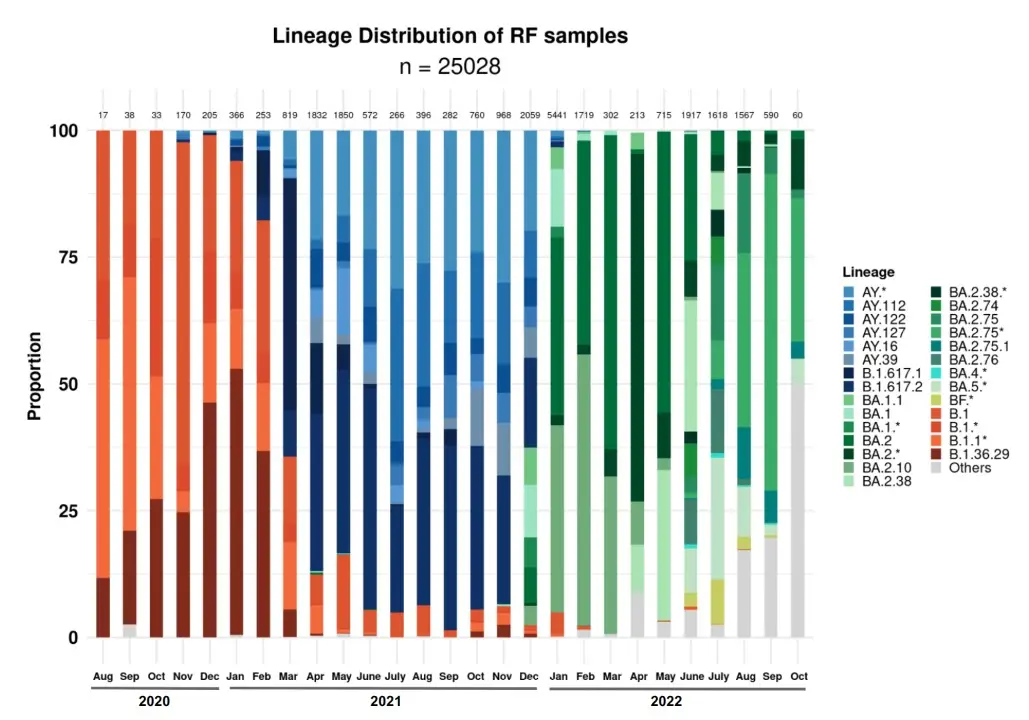
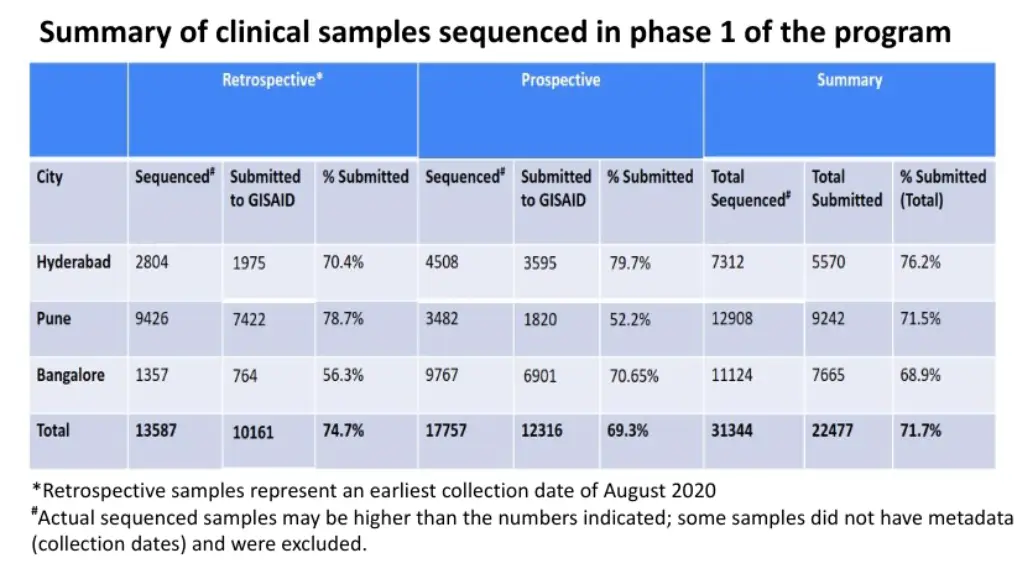
Soon after the consortium set up its surveillance network, the Omicron variant rapidly overtook Delta and its related lineages within a short span of 2-3 months all over the world. India too witnessed its third wave of COVID-19 infections, driven by Omicron and we were poised this time to catch the new variant and monitor its spread. Fortunately, the impact of Omicron and its sub-lineages proved to be less severe than Delta in terms of deaths and hospitalization outcomes, partly due to prior immunity and the remarkable progress in vaccine development and implementation. However, the ever- evolving nature of SARS-CoV-2 underscores the imperative for sustained, long-term monitoring programs, advanced surveillance systems, and early warning mechanisms to fortify our pandemic management strategies.
The Birth of APSI-India
The success of our initial efforts laid the foundation for an even more ambitious Phase 2, spanning from mid-2022 to 2024. In this phase, we have broadened our focus beyond SARS- CoV-2 to address a spectrum of public health concerns arising from infectious diseases in India. Under the umbrella of the Alliance for Pathogen Surveillance Innovations (APSI- India), we embarked on a mission to establish monitoring procedures and detection systems for various viral and bacterial pathogens, including antimicrobial resistance (AMR), guided by the One Health framework.
Directly analyzing the environment for pathogens is the most cost-effective way of public health surveillance to monitor and prevent future pandemics. Wastewater surveillance (WWS) allowed us to monitor changes in SARS-CoV-2 viral load directly from sewage treatment plants (STPs) and open drains in and around the consortium cities. This enabled us to develop an early warning system that could flag rising COVID-19 infections across city wards.
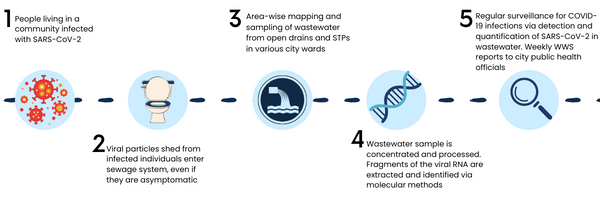 Infographic: Samruddhi Walaskar
Infographic: Samruddhi Walaskar While monitoring and identifying emerging variants of SARS-CoV-2 continues to remain a priority for the consortium, our work now leverages the insights gleaned from COVID-19 surveillance in densely populated urban centers. These hubs—Hyderabad, Pune, Bengaluru, and New Delhi—serve as nodal clusters from which we expand our capacity and networks, weaving together robust modules for pathogen surveillance in other cities, and hopefully rural communities in the future.
A Collaborative Ecosystem
APSI’s mission extends beyond the development of pathogen surveillance technologies; we aim to integrate these innovations into the public health system. This vision has led us to establish collaborative networks with hospitals, laboratories, academic institutions, and city municipal and administrative bodies in each of the consortium cities, ensuring a comprehensive approach to our objectives. Together, we develop proof-of-concept and functional, cost-effective tools such as those involving sewage and wastewater monitoring.
A crucial realization has been the need to bridge the gap between laboratory innovation and real-world impact. Actively seeking industry partners is integral to our mission, ensuring that our innovations can reach the market and be a part of active surveillance protocols.
The Power of Organization and Partnerships
Disease surveillance cannot be an isolated academic endeavor but is an integral part of public health. To drive this monumental program, we’ve assembled a diverse, multidisciplinary team, with research partners forming the backbone of the consortium’s innovations and contributing their specialized knowledge, resources, and capabilities. Seamless information flow is maintained via regular meetings, updates, and feedback mechanisms to keep all partners as well as stakeholders aligned, and to ensure consistency and reliability. Multiple levels of discussions are held regularly within and across clusters for strategic decision- making, resource allocation and charting the course ahead via effective coordination and communication.
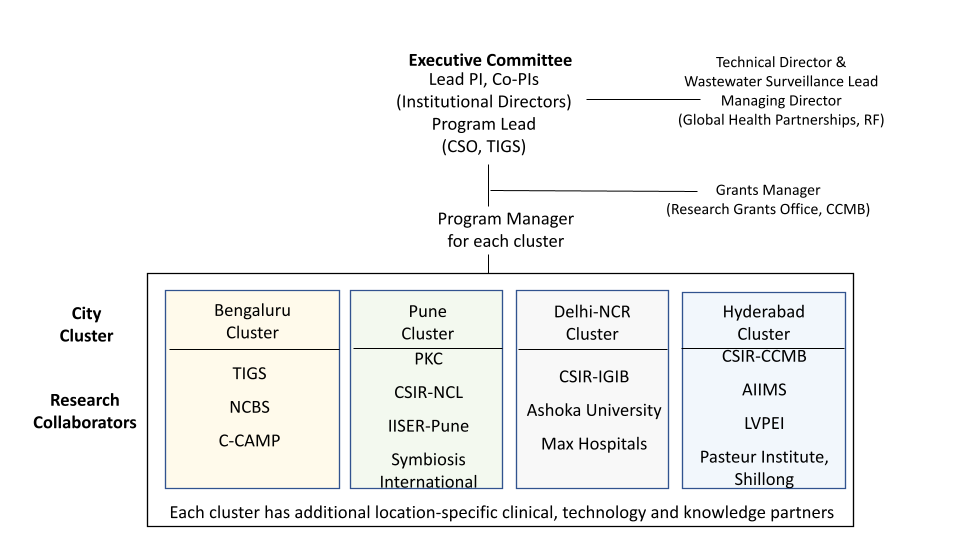 PI (Principal investigator); CSO (Chief Scientific Officer); RF (Rockefeller Foundation); TIGS (Tata Institute of Genetics and Society)/
NCBS (National Centre for Biological Sciences)/C-CAMP (Centre for Cellular and Molecular Platforms); PKC (Pune Knowledge Cluster)/
CSIR-NCL (National Chemical Laboratory)/ IISER (Indian Institute of Science Education and Research); CSIR-IGIB (Institute of
Genomics and Integrative Biology); CSIR-CCMB (Center for Cellular and Molecular Biology)/AIIMS (All India Institute of Medical
Sciences, Bibinagar)/LVPEI (LV Prasad Eye Institute).
PI (Principal investigator); CSO (Chief Scientific Officer); RF (Rockefeller Foundation); TIGS (Tata Institute of Genetics and Society)/
NCBS (National Centre for Biological Sciences)/C-CAMP (Centre for Cellular and Molecular Platforms); PKC (Pune Knowledge Cluster)/
CSIR-NCL (National Chemical Laboratory)/ IISER (Indian Institute of Science Education and Research); CSIR-IGIB (Institute of
Genomics and Integrative Biology); CSIR-CCMB (Center for Cellular and Molecular Biology)/AIIMS (All India Institute of Medical
Sciences, Bibinagar)/LVPEI (LV Prasad Eye Institute). I am fortunate enough to have been in the thick and thin of the efforts to bring together this ever-growing network of some of the best and brightest in the country. It has been an illuminating journey, marked by profound insights beyond academic rigor and expertise. Personally, I’ve learned that leadership is about fostering partnerships and nurturing a culture of trust, exploration and adaptability, while ensuring accountability. Being APSI’s program lead has been a transformative experience of mutual respect and a commitment to the greater good that reaffirms the power of collaborative teamwork.
I look forward to continuing to help steer the consortium toward its goals. Together, we are advancing the frontier of pathogen surveillance, and together, we can help create a safer, healthier world.
